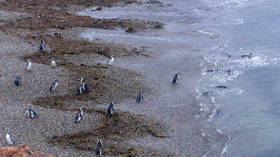Over one ton of mammoth tusks seized by Russian authorities (VIDEO)
The Federal Security Service (FSB) says smugglers hid the items under a floor and did not have the necessary documentation
Russia’s Federal Security Service (FSB) has announced the seizure of over one and a half tons of illegal mammoth tusks hoarded by smugglers in the far eastern region of Khabarovsk.
“Officers of the border department of the Federal Security Service of Russia in the Khabarovsk Territory and the Jewish Autonomous Region stopped the illegal circulation of paleontological remains of mammoth fauna,” the FSB’s Center for Public Relations said in a statement on Tuesday.
The tusks were being kept under a wooden floor in a non-residential building and were packed in polypropylene bags, according to officials. The FSB noted that the paleontological remains had no documents confirming the legality of their extraction.
The agency estimated the total cost of the find at over 50 million rubles ($555,000) and announced that an investigation had been launched into the smuggling ring.
In April, Russian customs officers seized nearly a ton of mammoth tusks at Moscow’s Sheremetyevo Airport. Officials reported at the time that the items were being shipped by a Moscow firm which had designated them as “ornamental material.”
Under Russian law, the export of mammoth tusks is only allowed after a license is obtained from the Culture Ministry. The head of the company which owned the tusks, valued at around 20 million rubles, is now under criminal investigation and could face up to seven years in prison, as well as a fine of up to 1 million rubles.
The tusks of wooly mammoths, sometimes referred to as ‘ice-ivory’, have seen a spike in circulation over the past two decades as they have become easier to obtain due to the melting Siberian permafrost. They are also not as heavily regulated as elephant ivory.
Back in 2019, authorities estimated that up to $50 million worth of mammoth tusks were being unearthed in Russia’s Yakutia Region every year. Officials have noted, however, that many of the tusks are obtained illegally by smugglers who aim to sell them to Asian markets.
You can share this story on social media:








Comments are closed.